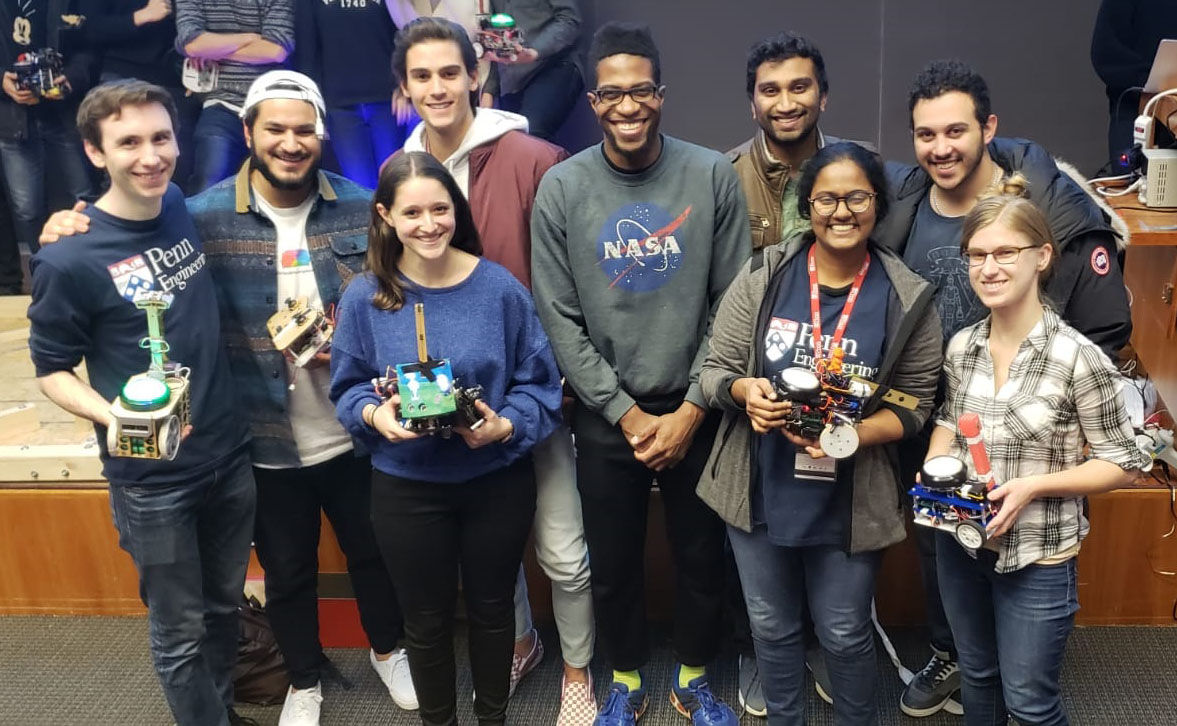
EE Degree Concentrations
Concentrations are focused areas of study that provide students with a critical level of expertise in a particular domain within EE, preparing the student for employment or graduate school in that domain. To satisfy the requirements for a concentration, students must complete at least four courses from the selected concentration as detailed below.
*Students may only pursue one Concentration. Please note: Students who are submatriculating MUST meet all of the concentration requirements BEFORE obtaining their undergraduate degree.
Mixed-Signal and RF Integrated Circuits
Circuits consist of interconnected elements that form the “brains” of complex electronic systems. They provide the physical platform to communicate, store and process information in electric form. These systems cover a wide range of real-life applications including wireless communications, Internet of Things, biomedical, sensing.
The Analog, Digital, and RF Integrated Circuits Concentration will equip students with the foundational knowledge to analyze and design analog and digital electronic systems consisting of transistors. Students will develop the ability to connect the physical and information world by developing complex modern electronic systems. Students will learn the operation of these systems through both analytical methods and simulations.
Must complete the following 2 courses:
ESE 3190 Fundamentals of Solid-State Circuits
ESE 3700 Circuit-Level Modeling, Design, and Optimization for Digital Systems
Select 2 approved electives from:
ESE 4190 Analog Integrated Circuits
ESE 5730* Chips-Design
ESE 5750* Chips-Measurements
ESE 5780 Radio Frequency Integrated Circuit Design
ESE 5800 Power Electronics
ESE 6680 Mixed Signal Circuit Design and Modeling
ESE 6710 High Frequency Power Electronics
ESE 6720 Integrated Communications Systems
*must take both ESE 5730 & ESE 5750
System-on-A-Chip Design
SOC designs are powerful chips that run modern cell phones, tablets, electronic gadgets, and automobiles. To design these systems, engineers must understand all aspects of modern chip design.
The SOC concentration prepares students to analyze, design, and utilize modern chips that include multiple processors, memory, communications, and specialized accelerators. You will learn hardware/software co-design from transistors to digital logic to processors and accelerators to multi-processor systems to high performance and low power software.
Must complete the following course:
ESE 3700 Circuit- Level Modeling, Design, and Optimization for Digital Systems
Select 3 approved electives from:
CIS 4710 Computer Organization and Design
ESE 5320 System-on-a-Chip Architecture
ESE 5390 Hardware/Software Co-Design for Machine Learning
ESE 5730* Chips-Design
ESE 5750* Chips-Measurements
*must take both ESE 5730 & ESE 5750
Photonics and Quantum Technology
Modern device technologies rely on the control of light and materials at the smallest scales. Examples include LED displays, lasers, optical transceivers, solar cells, photonic integrated circuits, sensors, medical therapies, secure communication systems, and quantum computers. This concentration will arm students with a broad understanding of optics and device nanofabrication, with options to further specialize in nanophotonics, integrated photonics, and quantum technology. Students completing these courses will be positioned to pursue advanced degrees or engage with industry to develop cutting-edge photonics technologies and quantum devices.
Must complete the following 2 courses:
ESE 3200 Qubit Lab – A Hands on Introduction to Quantum Devices
ESE 3300 Principles of Optics and Photonics
Select 2 approved electives from:
CIS 3990 Special Topics – Introduction to Quantum Computing
ESE 5090 Quantum Circuits and Systems
ESE 5100 Electromagnetic and Optics
ESE 5130 Prin of Quantum Tech
ESE 5230 Quantum Engineering
ESE 5360 Nanofabrication and Nanocharacterization
ESE 6730 Integrated Photonics Systems
Microsystems and Nanotechnology
The Microsystems and Nanotechnology concentration provides students with a fundamental knowledge of how transistor, semiconductor, photonic, and electromechanical devices operate and are fabricated. The elective courses allow students to specialize and gain a deeper understanding in specific areas such as electromagnetics and antennas, microelectromechanical systems (MEMS), deeply scaled CMOS, next-generation transistor technologies, quantum principles and devices, and nanoscience.
Must complete the following course:
ESE 5250 Nanoscale Science and Engineering
Select 3 approved electives from:
ESE 3300 Principles of Optics and Photonics
ESE 5100 Electromagnetic and Optics
ESE 5210 The Physics of Solid State Energy Devices
ESE 5290 Introduction to Micro- and Nano-electromechanical Technologies
ESE 5360 Nanofabrication and Nanocharacterization
ESE 6210 Nanoelectronics
ESE 6250 Nanorobotics
Robotics
The pursuit of robotics involves the theory, design, programming, and testing of intelligent machines that perform functions in our world’s broad variety of environments. A major barrier to the development of agile robots that can operate effectively in unstructured environments is the real-time coordination of their many motions, in response to the noisy data streams coming in from their sensors. To build and use robotic systems, engineers must understand the complex models and advanced mathematical methods required to control them. Students will also be equipped with an understanding of the functional capabilities and limits of the many different hardware and software tools available to guide the design and deployment of these robotic systems.
Must complete the following course:
ESE 4210 Control for Autonomous Robots
Select 3 approved electives from:
ESE 5000 Linear Systems Theory
ESE 5050 Feedback Control Design and Analysis
MEAM 5200 Introduction to Robotics
ESE 6150 F1/10 Autonomous Racing Cars
ESE 6190 Model Predictive Control
ESE 6250 Nanorobotics
ESE 6500 Learning in Robotics
MEAM 6200 Advanced Robotics
Data Science
Data Science (DS) is an interdisciplinary field aiming to extract knowledge and insights from complex datasets using tools from probabilistic modeling, statistical inference, machine learning, and engineering. The DS concentration will equip students with the foundational knowledge and technical expertise to understand the tools needed to transform unstructured sources of information into actionable decisions in engineering domains. The students will dive into the fundamentals of probability and statistics, as well as learn, implement, and experiment with data analysis techniques and machine learning algorithms. Students in this concentration will develop the ability to responsibly collect and manage data, think critically, and make data-driven decisions.
Must complete the following 2 courses:
ESE 3060 Deep Learning: A Hands-on Introduction
ESE 4020 Statistics for Data Science
Select 2 approved electives from:
NETS 3120 Theory of Networks
ESE 5140 Graph Neural Networks
CIS 5200 Machine Learning
CIS 5450 Big Data Analytics
ESE 5460 Principles of Deep Learning
ESE 6500 Learning in Robotics
